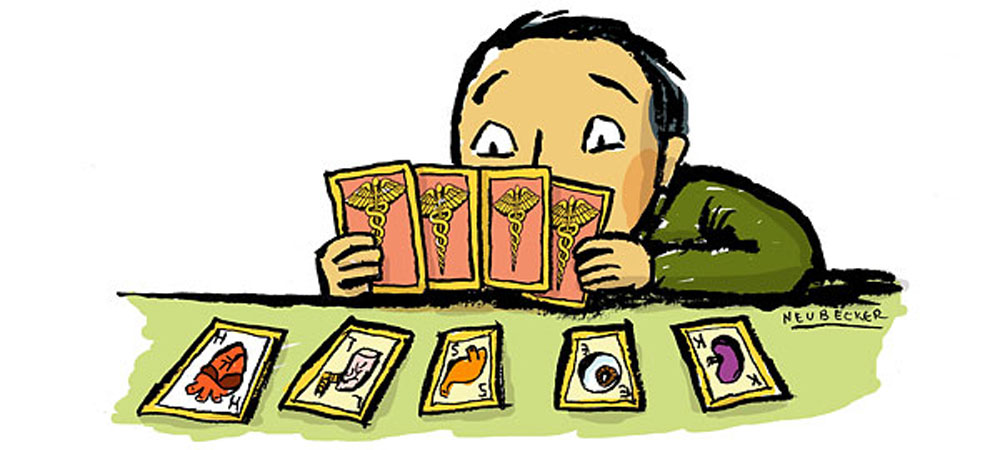The New York Times, 19 September 2006
Several years ago, an obese, diabetic patient of mine insisted on knee-replacement surgery against the wishes of her doctors, who believed that it would be too dangerous. She came through with flying colors.
While everyone rightly praised the efforts of her surgeon and physical therapist, another factor in her recovery was ignored: luck. Why are doctors and patients so reluctant to discuss a phenomenon that permeates medicine every day?
The likeliest reason that luck — good or bad — is so often disregarded is that at first glance, it appears contrary to the scientific basis of medicine. That is, doctors employ the best scientific knowledge available to diagnose and treat disease. How well patients do thus reflects this acumen.
Luck seems to have become particularly anathema in an era of evidence-based medicine, in which physicians and patients are encouraged to learn the latest relevant data to guide decisions. Dr. Peter A. Ubel, a University of Michigan internist and author of “You’re Stronger Than You Think,” believes that his patients prefer biological explanations of why they are sick, rather than hearing that they have bad genes or bad luck.
But given the biological variability within given diseases, like cancer, and the fact that variable genetic makeup leads different individuals to respond differently to diseases and therapies, even better scientific knowledge will not eliminate the role played by luck. Chance, the British physician R. J. Epstein wrote in the Quarterly Journal of Medicine, ensures different outcomes within given sick populations.
A few examples? Roughly 1 percent of North American whites are highly resistant to H.I.V. infection because they lack a certain cell surface protein. Lucky. Roughly 5 percent of people infected with the hepatitis B virus develop chronic active hepatitis, an often serious liver disease. Unlucky.
This phenomenon can be seen in individual cases of disease as well. When the cyclist Lance Armstrong was given a diagnosis of testicular cancer in 1996, it had already metastasized throughout his body, including his brain. His doctors gave him less than a 50 percent chance of survival.
Mr. Armstrong’s subsequent cure can surely be attributed to the chemotherapy he received, but the fact is that other men with similar cases of testicular cancer died despite the same regimen. He has noted his good fortune, saying that his survival was mostly “a matter of blind luck.”
But others shy away from identifying either good or bad luck. In her recent book “The Year of Magical Thinking,” Joan Didion describes the death of her husband, John Gregory Dunne, from a heart attack. Noting that he had a long history of heart problems, she declined to attribute his death to bad luck.
But it seems that Mr. Dunne was unlucky — twice. First, he had inherited heart disease. And second, it had killed him at 71, even though others with his disease, coronary atherosclerosis, now live into their 80’s and 90’s. Of course, those who died of heart disease at ages even younger than Mr. Dunne’s were unluckier.
A more frank acknowledgment of the role luck plays has another virtue: eliminating the tendency to second-guess and blame patients. Medicine today puts a huge emphasis on modifying risk factors for diseases, urging patients to take medications for diabetes and high cholesterol, for example, and to improve their diets.
But risk reduction is not risk elimination. Even well-established interventions, like regular screening mammograms in women over 50 and antihypertensive pills for high blood pressure, lower the risk of death by 30 percent at most. That means that plenty of patients who are 100 percent compliant with their doctors’ wishes will still die of breast cancer or complications of hypertension, like heart attacks or strokes. These are the unlucky ones.
And then there are always those patients who constantly disregard medical recommendations and seemingly suffer no ill effects. You guessed it: lucky.
This is not to say that patients might better spend their time wishing on stars than taking pills. As the cases of Lance Armstrong and my knee-replacement patient demonstrate, seeking out the best medical care surely increases one’s chances of doing well. There are just no guarantees.
Even Joan Didion, who played down the role of bad luck in her husband’s death, realized there was no value in revisiting what more might have been done to save his life. Multiple medical interventions, she wrote, had already postponed his death. When he died in their living room, no action by her “could have given him even one more day.”
And what of my patient? She did well for several months after her surgery. Then one day, while she was at the hospital getting a routine X-ray, she suddenly slumped over from a heart attack, a complication of diabetes. The staff could not resuscitate her, and she died. Her luck had run out.
